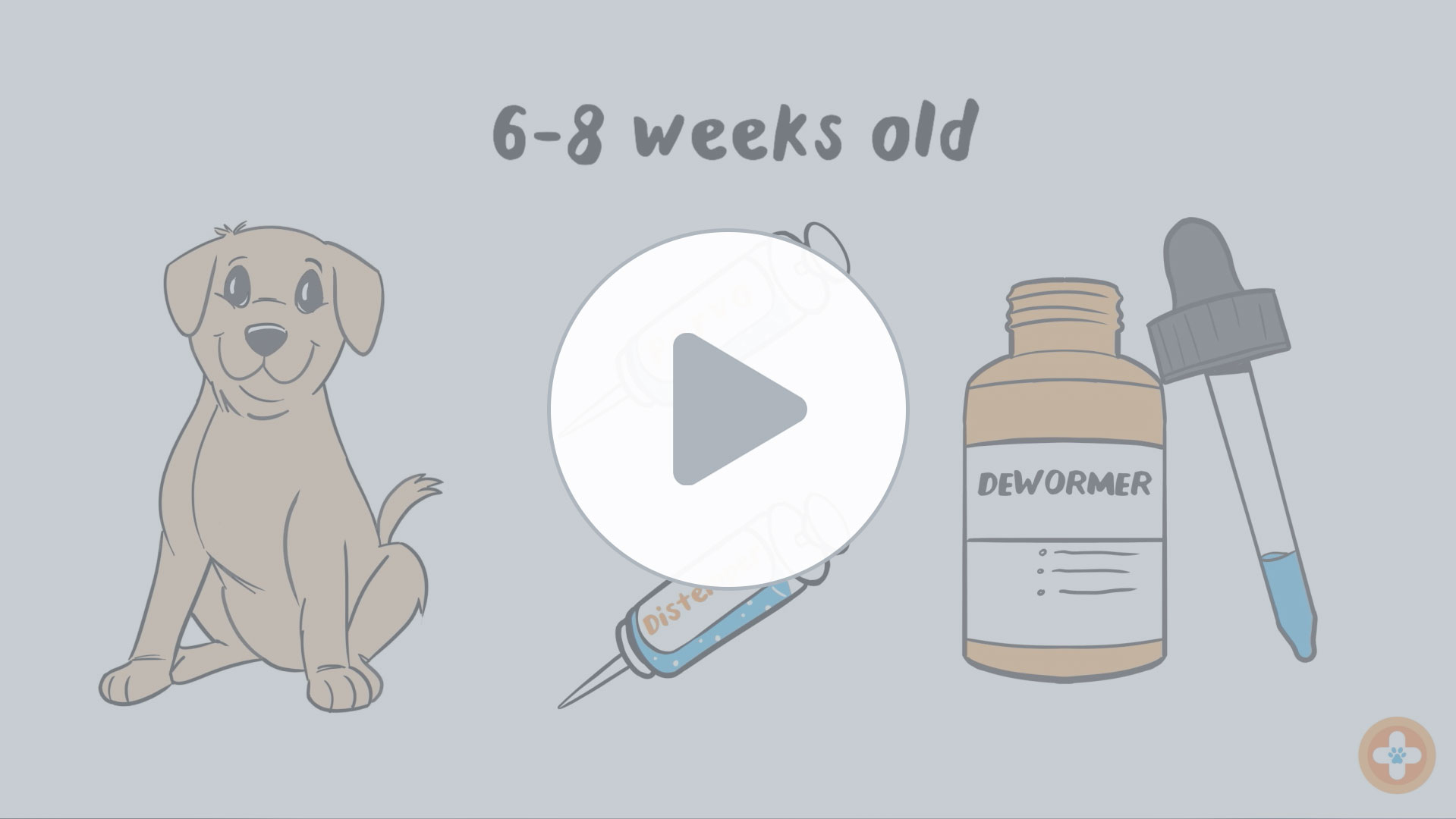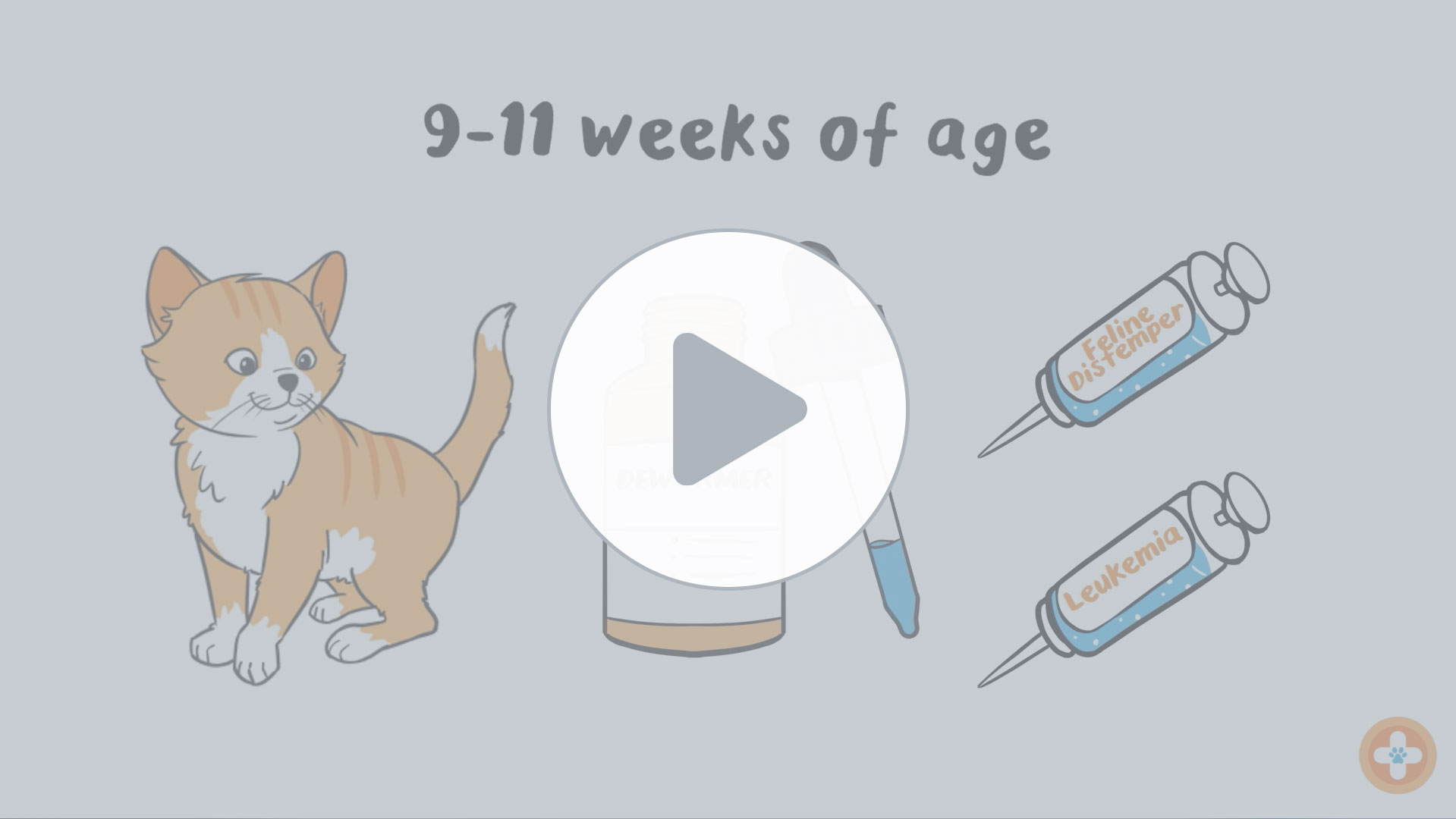Dog Vaccination Guide
- 1st Round Puppy (6-8 weeks old): DAPPv and dewormer
- 2nd Round Puppy (9-11 weeks old): DAPPv booster, bordetella and dewormer
- 3rd Round Puppy (3 months old): Rabies, DAPPv booster, bordetella booster and dewormer
- Annually: Rabies booster, DAPPv booster, bordetella booster, heartworm test, heartworm prevention and dewormer

Cat Vaccination Guide
- 1st Round Kitten (6-9 weeks old): FVRCP, FELV and dewormer
- 2nd Round Kitten (9-11 weeks old): FVRCP booster, FELV booster and dewormer
- 3rd Round Kitten (3 months old): Rabies, FVRCP booster, FELV booster and dewormer
- Annually: Rabies booster, FVRCP booster, FELV booster and dewormer

Bordetella for dogs (commonly called “kennel cough”): The bordetella bacteria causes an extremely contagious upper respiratory infection. Puppies should be given two doses of the Bordetella vaccine, about a month apart. Annual boosters are recommended if your dog regularly interacts with large groups of unknown dogs (boarding facilities, groomers, dog parks, etc.)
Canine Influenza for dogs (CIV): Commonly known as “the canine flu,” canine influenza is easily transmitted between dogs through a combination of aerosols, droplets, and direct contact with respiratory secretions. Annual boosters are recommended if your dog regularly interects with large groups of unknown dogs (boarding facilities, groomers, dog parks, etc.) We do not offer this vaccine at our facilities but we do recommend it.
Dewormer for dogs and cats: Strongid-T is a general dewormer that treats hookworms and roundworms. Most puppies are born with internal parasites or worms derived from their mother, so puppies should be given three doses of this dewormer. It is also used to treat worms in adult dogs.
Dewormer for Tapeworm in dogs and cats: Virbantal (dogs) and Drontal (Cats) is a dewormer that treats tapeworms. Tapeworms are caused by the ingestion of fleas.
Distemper, Hepatitis, Parainfluenza and Parvovirus for dogs (DAPPv): Commonly called the “distemper shot,” this combination vaccine actually protects against five diseases: canine distemper, adenovirus, hepatitis, parainfluenza, and parvovirus. It’s given to puppies in a series of three vaccines and then given every year to adult dogs. Along with rabies, DHPP is considered a set of core vaccines: those universally recommended for dogs no matter what the circumstance.
Feline Leukemia Virus for cats (FeLV): Cats at greatest risk of FeLV infection are those that may be exposed to infected cats, either via prolonged close contact or through bite wounds. Such cats include cats living with infected cats or with cats of unknown infection status, cats allowed outdoors unsupervised where they may be bitten by an infected cat, and kittens born to infected mothers. Annual vaccinations are recommended.
Feline Leukemia Virus (FeLV) testing for cats: This testing is recommended for all cats, especially those with unknown histories.
Feline Immunodeficiency Virus (FIV) testing for cats: This testing is recommended for all cats, especially those with unknown histories. Feline immunodeficiency virus (FIV) is one of the most common and consequential infectious diseases of cats around the world. In infected cats, FIV attacks the immune system, leaving the cat vulnerable to many other infections. The primary mode of transmission for FIV is through bite wounds from an infected cat.
FVRCP Combination for cats: This vaccine protects against common upper respiratory diseases such as Rhinotracheitis, Calici, Chlamydia, and Panleukopenia, that cats can catch even if they live indoors. It is recommended if your cat is ever boarded, hospitalized, etc. Many veterinarians, boarding and grooming facilities require this vaccination.
Heartworm Preventative Medication for dogs: Heartworms are contracted through mosquito bites. The best way to reduce the risk of infection is to administer a safe heartworm preventive that kills immature worms before they cause damage. Treatment for heartworms is risky and expensive so it is important to use year-round preventative medication since heartworm disease is preventable. Puppies should begin on heartworm preventative by 8 weeks of age. Any dog older than 7 months should be tested prior to beginning heartworm preventative. Testing is required annually even if your dog has been on preventative.
Leptospirosis for dogs: Dogs can become infected with “Leptospira” bacteria by exposure to contaminated water, exposure to urine from an infected animal, bite wounds, and ingestion of tissues from infected animals. Annual boosters are recommended if your dog has potential to come in contact with any wild animals or unknown bodies of water.
Rabies for cats and dogs: Rabies vaccines are required by law for all cats and dogs. Rabies is a fatal but preventable viral disease. It can spread to people and pets if they are bitten or scratched by a rabid animal. In the United States, rabies is mostly found in wild animals like bats, raccoons, skunks, and foxes. The rabies virus infects the central nervous system. If a person does not receive the appropriate medical care after a potential rabies exposure, the virus can cause disease in the brain, ultimately resulting in death. Rabies can be prevented by vaccinating pets, staying away from wildlife, and seeking medical care after potential exposures before symptoms start.

